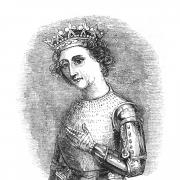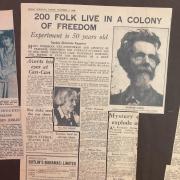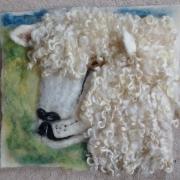Lorraine Child guides us gently through history's pages
Street scenes from the past are more than snapshots of a moment in time. They capture the lifestyle, dress and work of those photographed, held forever by the click of a shutter. As was the case in Victorian England, when a photographer strolled into a town or village, carrying strange apparatus, people stopped in their tracks to see what he was about. It was an event. We now snap every movement with our phones; no jot or tittle is unworthy of a place in the cloud.
Many photographs were taken for advertising and marketing, with employees dressed in best bibs and tuckers, aprons starchy-white, faces beaming success. Such is the photograph of Barnby Bendall and Company Ltd’s removal and depository building, c.1805, in St James Square, Cheltenham, taken around 1899. The scene is uncluttered, calm, with a wonderfully ornate lamppost in sharp focus. Those gathered are posed for the photographer and standing stock-still for the long exposure times of the day.
Just one person is seemingly unimpressed: an old shoe-shine boy leaning against a wall, presumably used to life looking down. A removal wagon is emblazoned with unmissable advertising; the horsepower at the front stands restrained and noble, waiting for the command to proceed. Today’s streets are sign-crowded and pock-marked with notices heralding baby yoga, removals by the hour, lost parrots, and appeals for new blood at the Knit-a-sock club. We register none of it, like whitewash in the snow.
Barnby Bendall and Company Ltd was founded by Peter Bendall in 1839, and the business continued until 1976. Their other depository at St George’s Place is now Formal House, an award-winning urban office space with a happening vibe, flooded with natural light from large industrial windows. Bendall’s premises in Tivoli Works was the place to go for a good beating: therein was a ‘Dust Eradicating Machine’ to remove stubborn dirt from carpets. At 8 Tivoli Place, discerning customers could buy wallpaper and upholstery fabrics; soft furnishings were available from their retail store in Newington House, Suffolk Road.
Then, as now, there was corporate responsibility, and careless employees could damage the good name of a business. Two letters of April 1910 convey in splendidly irascible tones a complaint regarding damage to Framilode swing bridge. They are worthy of full quotation, with the kind permission of the archivist at Stroudwater History. This treasure trove of information relating to the heritage of the canal will keep the diggers among us happy for months.
Letter to Barnby Bendall & Co, furniture removers, Cheltenham, Mon 18 Apr 1910
On 12th April your steam engine carrying furniture to the rectory passed over the swing bridge at Framilode despite a warning that it was only fit for light traffic such as carts and vans. Four planks were broken and the bridge shaken and greater damage may come to light. The cost of replacing the 4 planks was £1:4:0. Please send a cheque in settlement promptly as I have a Committee meeting shortly.
Thu 28 Apr 1910
Re damage to the swing bridge at Framilode, I am surprised at the excuse put forward. Any reasonable driver should realise the bridge was not suitable to bear a steam engine weighing 5 tons and your driver was warned by our man. The goods could have been taken over by van and horses. No further damage has been found and as the cost is low I will agree to accept half the claim viz 12s which should no doubt be paid by your man.
Obviously late for his investiture at Cheltenham Charm Institute.



























